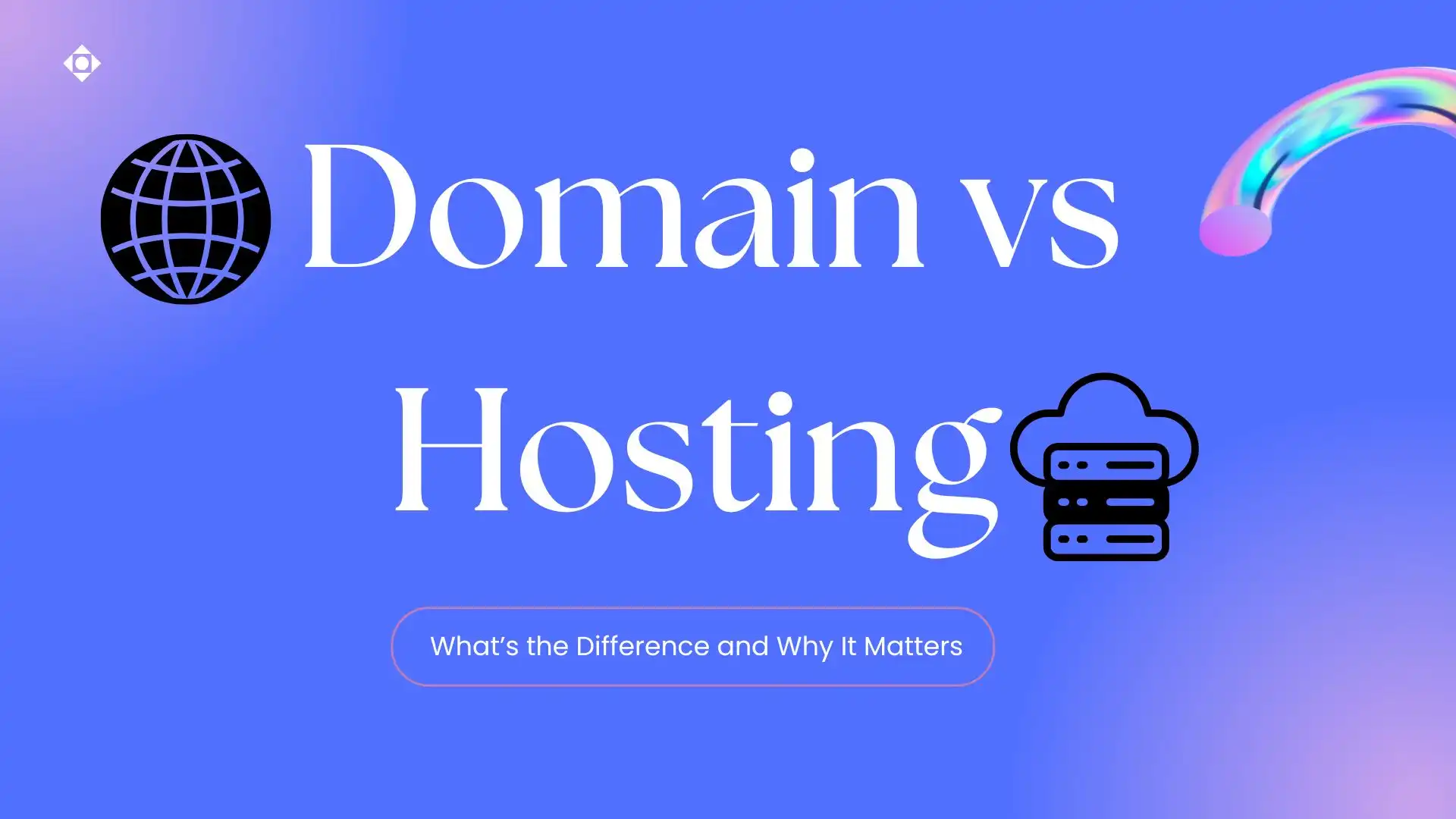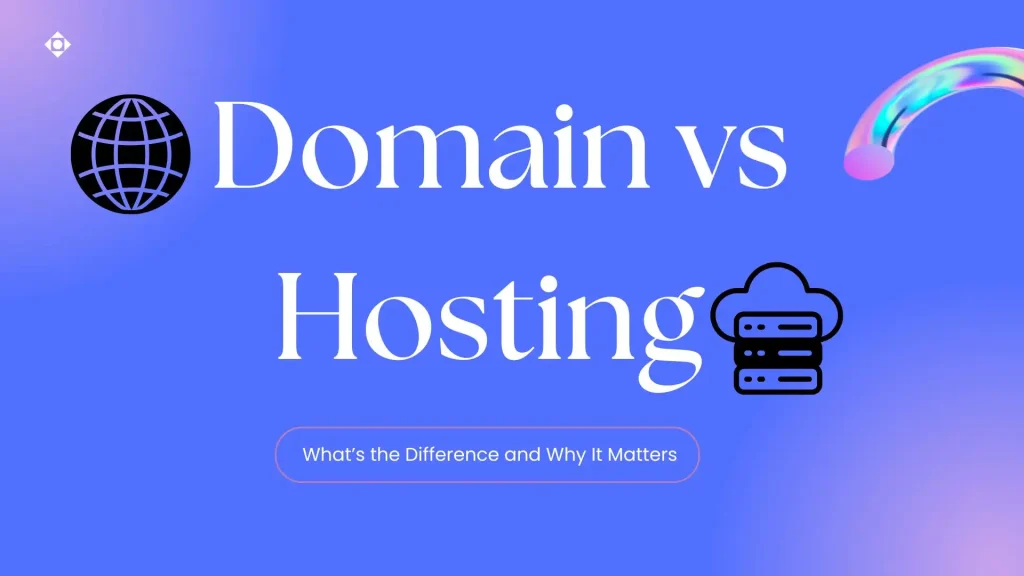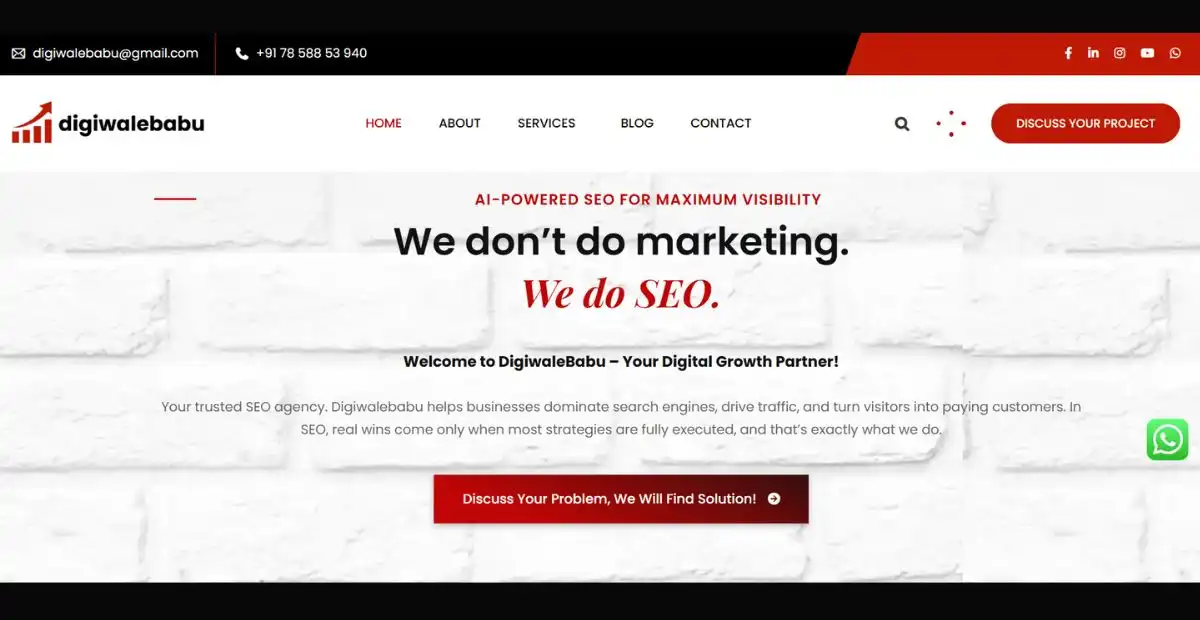
Domain vs Hosting: What’s the Difference and Why It Matters
Table of Contents
Having a strong online presence starts with understanding the essentials of website creation. Two key elements that form the backbone of any website are the domain and hosting. While often confused, domain vs hosting serve very different purposes: one gives your website an address that users can find, while the other provides the space where all your website files are stored and accessed.

At Digiwalebabu, we break down these concepts, explore their differences, and explain why distinguishing between the two is crucial for building a reliable and high-performing website.
What is a Domain?
A domain is essentially your website’s address on the internet. Think of it as the street address of your online home. Just as you need a physical address to receive mail, a website needs a domain so users can locate it on the internet. Domains are human-readable names that replace numerical IP addresses, making it easier for visitors to access websites.
- Example: Digiwalebabu.com is a domain name, while its actual server location is represented by an IP address like 192.168.1.1.
- Domains are purchased and registered through domain registrars such as GoDaddy, Namecheap, or Google Domains.
- A domain typically has two main parts:
- Name: This is your chosen identifier (e.g., Digiwalebabu).
- Extension: Also called TLD (Top-Level Domain), such as .com, .org, or .net.
Importance of a Domain:
- Provides your website with a professional identity.
- Improves brand recall and credibility.
- Plays a role in SEO, especially when it includes keywords relevant to your business.
What is Hosting?
While a domain is your website’s address, hosting is the actual home where your website lives. Hosting is a service that allows individuals and organizations to store their website files, images, videos, and databases on a server so that they can be accessed online.
- Websites are made of files, scripts, and databases, all of which need to be stored on a physical server.
- Hosting providers, like Bluehost, HostGator, or Digiwalebabu’s recommended services, rent space on these servers.
- Different types of hosting services include:
- Shared Hosting – Multiple websites share the same server resources. Ideal for small blogs or startups.
- VPS Hosting – Virtual Private Server hosting offers dedicated portions of a server, providing more control and resources.
- Dedicated Hosting – Full control over a server, best for high-traffic websites.
- Cloud Hosting – Scalable hosting using multiple servers to ensure high uptime and performance.
Importance of Hosting:
- Determines website speed and performance.
- Ensures website uptime and accessibility.
- Provides security features to protect your site from cyber threats.
Domain vs Hosting: Key Differences
Understanding the domain vs hosting difference is crucial for anyone starting a website. While the two are interconnected, they serve entirely different functions.
| Feature | Domain | Hosting |
| Definition | Your website’s address on the internet. | The server space where your website files are stored. |
| Purpose | Helps users find your website. | Makes your website accessible online. |
| What You Buy | Domain name through a registrar. | Server space through a hosting provider. |
| Examples | Digiwalebabu.com, Google.com | Bluehost server, HostGator server |
| Duration | Usually renewed annually. | Can be monthly or annually, depending on the plan. |
| SEO Impact | Keywords in the domain can influence SEO. | Website speed and uptime affect SEO. |
| Control | You manage domain registration and renewal. | You control files, databases, and server settings. |
Why Domain vs Hosting Matters
Choosing the right domain and hosting is not just about setting up a website—it affects your website’s performance, user experience, and online credibility.
1. Brand Identity
A domain is your brand’s digital identity. A memorable and relevant domain makes it easier for users to remember your website and trust your brand. Conversely, poor hosting with frequent downtimes can harm credibility.
2. Website Performance
Hosting directly influences how fast your website loads. Slow websites frustrate visitors and increase bounce rates. Even with a perfect domain, poor hosting can drive users away.
3. SEO and Visibility
Search engines consider multiple factors in ranking websites. While a domain containing relevant keywords helps, hosting impacts page speed, uptime, and security, all of which influence SEO rankings.
4. Security and Backups
Reliable hosting ensures your website is secure from cyberattacks. Regular backups, SSL certificates, and server-level security prevent data loss and ensure trustworthiness.
5. Scalability
Good hosting allows your website to grow. Whether your traffic increases or you add e-commerce functionality, scalable hosting ensures your website continues to perform optimally.
Choosing the Right Domain
| Tip | Description | Why It Matters |
| Keep it short and simple | Select a domain name that is concise and easy to type. | Short domains are easier to remember and reduce user errors when typing. |
| Use relevant keywords | Include words related to your business, niche, or services. | Helps with SEO and improves search engine visibility. |
| Choose the right extension | Pick a suitable TLD such as .com, .net, .co, or .in. | Enhances credibility and aligns with your target audience or region. |
| Avoid numbers and hyphens | Do not use numbers, hyphens, or special characters in the domain. | Prevents confusion and ensures the domain is easy to share and remember. |
| Check availability on social media | Ensure the domain name or brand name is available across social platforms. | Maintains brand consistency and improves online recognition. |
Choosing the Right Hosting
Selecting hosting depends on your website needs and budget:
| Hosting Type | Best For | Pros | Cons |
| Shared Hosting | Beginners, small blogs | Affordable, easy to use | Limited resources, slower speeds |
| VPS Hosting | Growing businesses | Better performance, more control | More expensive than shared |
| Dedicated Hosting | Large businesses, high traffic | Full control, best performance | High cost, requires technical knowledge |
| Cloud Hosting | Websites with fluctuating traffic | Scalable, reliable, pay for what you use | Can be complex to set up |
Other Considerations:
- Uptime guarantee (preferably 99.9% or higher)
- Customer support availability
- Security features like SSL, firewalls, and malware scanning
- Backup and recovery options
How Domain and Hosting Work Together
Although domain and hosting are distinct components, they must work together for a website to function properly. The domain acts as your website’s address, while hosting is the space where all your website files live. Without either, your website cannot go online. The process of making a website live involves several key steps:
- Domain registration: You secure a unique domain name through a registrar, giving your website an address that users can find.
- Choose hosting: Purchase hosting space from a provider to store your website files, databases, and media.
- Connect domain to hosting: Update DNS settings so that your domain points to the correct hosting server.
- Upload website files: Use tools like cPanel, FTP, or website builders to place your website files on the hosting server.
- Website goes live: Once everything is connected and uploaded, your website becomes accessible to anyone typing your domain name in a browser.
Think of it like this: the domain is the address where people find you, and hosting is the house where all your content resides. Both must work in tandem to ensure your website is functional, accessible, and ready for visitors.
Common Misconceptions About Domain vs Hosting
There are several common misconceptions about domain vs hosting that often confuse beginners. Understanding these myths is important to make informed decisions when setting up a website.
Many people assume that buying a domain automatically includes hosting, but this is not true—domains and hosting are separate purchases. Similarly, some believe that hosting guarantees a good domain name, when in reality, the domain must be chosen and registered independently.
Another frequent misconception is the need for unlimited hosting; not all websites require it, and hosting should be selected based on expected traffic and website size. Finally, some think that a domain name affects website speed, whereas performance depends entirely on the quality of the hosting provider.
- “Buying a domain automatically gives me hosting” – False. Domains and hosting are separate.
- “Hosting guarantees a good domain name” – False. You select and register your domain independently.
- “I need unlimited hosting” – Not always. Choose hosting based on your site’s content and traffic needs.
- “A domain name affects website speed” – False. Website speed depends on hosting quality, not the domain.
Tips for Beginners
For beginners stepping into the world of websites, making the right choices with domains and hosting can feel overwhelming. A few simple tips can help you start strong and avoid common mistakes.
It’s always better to begin with shared hosting since it is affordable and beginner-friendly, then upgrade as your website grows in traffic and requirements. When choosing a domain, ensure it is simple to spell, pronounce, and remember for better brand recognition.
Selecting a hosting provider that offers reliable customer support will save you time and stress when technical issues arise.
- Start with shared hosting – Affordable and suitable for beginners; upgrade later as your website expands.
- Choose a simple domain – Easy to spell, pronounce, and recall for better user engagement.
- Invest in reliable customer support – A responsive hosting provider helps resolve issues quickly.
- Regularly back up your site – Keep extra backups beyond those provided by your host.
- Add SSL certificates – Boosts website security and improves SEO visibility.
Digiwalebabu’s Recommendations

At Digiwalebabu, we always recommend treating domain and hosting as two separate but equally important investments.

A strong, premium domain helps create a memorable brand identity and builds trust among users, while reliable hosting ensures your website runs smoothly, loads quickly, and remains secure.
Over the years, our team has guided many businesses in India and across the globe in selecting the right domain and hosting combinations that match their growth goals.
Why it matters:
- A premium domain strengthens brand recognition and credibility.
- Reliable hosting minimizes downtime and ensures consistent website availability.
- Fast, secure hosting improves user experience and builds trust.
- Both domain and hosting choices directly impact SEO rankings.
- A solid setup supports future scalability as your business expands.

Summary Table: Domain vs Hosting in Bullet Points
| Aspect | Domain | Hosting |
| Definition | Website address | Server space for website files |
| Purpose | Identify website on the web | Make website accessible online |
| Purchase | Domain registrar | Hosting provider |
| Components | Name + Extension | Server, storage, bandwidth |
| Impact on SEO | Keywords help | Speed, uptime, and security affect ranking |
| Control | Renewal & management | Server settings, files, databases |
| Duration | Annual | Monthly/Annual |
| Example | Digiwalebabu.com | HostGator, Bluehost servers |
| Importance | Branding, visibility | Performance, scalability, security |
People Also Ask About Domain vs Hosting
What is the main difference between domain and hosting?
A domain is the address of your website (like www.digiwalebabu.com), while hosting is the server space where your website files, data, and content are stored.
Can I buy a domain without hosting?
Yes, you can register a domain without hosting. However, the website will only go live once you connect the domain to a hosting service.
Can I host a website without a domain?
Technically yes, you can host a site using the server’s IP address, but without a domain, it won’t be user-friendly or professional.
Do I need to buy domain and hosting from the same provider?
Not necessarily. You can purchase them separately from different providers and connect them via DNS. Many people prefer bundling for convenience.
How much does domain and hosting cost?
Domains usually cost between $10–$20 per year, while hosting can range from $3–$30 per month depending on the type (shared, VPS, or dedicated).
Does my domain affect SEO?
Yes, your domain name can impact SEO slightly—short, keyword-rich, and brandable names perform better. But speed and performance depend on hosting quality.
Which hosting is best for beginners?
Shared hosting is the best option for beginners because it’s affordable and easy to manage. You can upgrade later as your traffic grows.
What happens if I don’t renew my domain or hosting?
If you don’t renew your domain, it becomes available for others to purchase. If you don’t renew hosting, your website files will go offline.
Is free hosting a good idea?
Free hosting is risky as it offers limited resources, poor speed, and little to no customer support. For professional websites, always choose paid hosting.
Why does Digiwalebabu recommend treating domain and hosting separately?
Because a premium domain builds brand recognition, and reliable hosting ensures speed, security, and uptime. Together, they form the foundation of a strong online presence.
Final Thoughts
Choosing the right domain and hosting is one of the most important steps in establishing your online presence. While the domain vs hosting debate often confuses beginners, understanding their distinct roles ensures you make informed decisions. Remember:
- Domain = Your online address
- Hosting = Your website’s home
Together, they form the foundation of a successful, professional, and high-performing website. At Digiwalebabu, we emphasize that investing time and resources in selecting the right domain and hosting setup is an investment in your brand’s digital future.
By following best practices, beginners and seasoned professionals alike can ensure their website is fast, secure, and accessible, while also boosting credibility and visibility in search engines.
